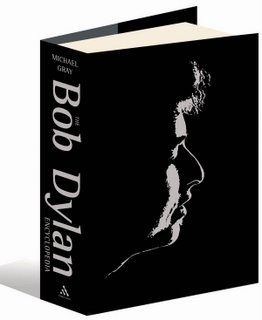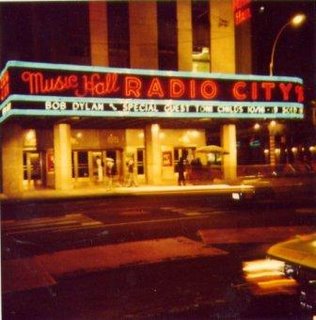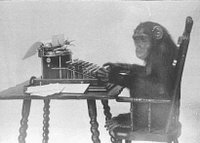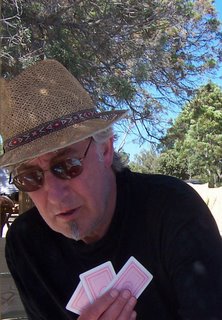BOB DYLAN ENCYCLOPEDIA: A BLOG 2006-2012

About Me
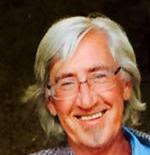
- Name: Michael Gray
the pioneer of Dylan Studies; writer, public speaker, critic; became a Doctor of Letters in 2015 (awarded by the University of York, UK)
Subscribe to
Comments [Atom]

Wednesday, March 29, 2006
Nice cartoon in the new edition of Private Eye, which arrived this morning. Man sits at his computer, looking cheery and oblivious and saying to his unimpressed companion, "Just updating my blog." What's he's writing on the screen, in enormous letters, is simply ME ME ME ME ME ME ME ME.
Monday, March 27, 2006
Wednesday, March 22, 2006
Tuesday, March 21, 2006
A SHORT CLIP FROM THE ENTRY ON THE BAND
This is a short sample: a brief extract from The Bob Dylan Encyclopedia's entry on THE BAND:
"The whole of the amazing 1966 tour took place without Levon Helm. On the early North American dates, from February 5 at White Plains NY through to March 26 in Vancouver, Canada, the drummer was Sandy Konikoff; after that, and so for all the tumultuous Australian and European dates, including the historic Manchester Free Trade Hall concert in May, the drummer was Mickey Jones.
Drummer aside, however, this blazing, transcendent music was by the Hawks, which is to say The-Band-in-waiting. So loud and badly reproduced in the halls, so smudgily filmed yet mercifully so well recorded, this was the most radical, oceanic and storming electric music ever played live. How was it that Dylan, a solo performer who until Newport 1965 hadn’t played live with a group since he was a schoolboy, and The Hawks, whose earlier music was undistinguished bar-room blowing, coalesced so incandescently well, that they could go on stage in Liverpool in May 1966 - the city that had so recently been the center of the musical universe - and hurl at their audience rock music a thousand times more sublime, challenging, multi-layered and exciting than anything Liverpudlians had ever heard before? Impossible to say, but easy to prove. Play that night’s ‘Just Like Tom Thumb’s Blues’. By this point Dylan’s cawing voice and searing harmonica were both perfectly integrated instruments in amongst those of the Hawks, whose hard-won knowledge of each other’s playing freed them all to ride each moment, in a ceaseless interchange of fiery, creative levitation.
In extraordinary contrast, in the calm of the countryside and after Dylan’s long post-motorcycle crash unwinding, their next co-operative project was the informal Basement Tapes sessions. But what about all the time in between the two - between the end of May 1966 and the spring of 1967? The group, supposedly such a hard-working, on-the-road unit, played not a single live date that anyone has been able to discover.
What’s more, Levon Helm was out of the picture all that time - and still missing when the Basement sessions began."
"The whole of the amazing 1966 tour took place without Levon Helm. On the early North American dates, from February 5 at White Plains NY through to March 26 in Vancouver, Canada, the drummer was Sandy Konikoff; after that, and so for all the tumultuous Australian and European dates, including the historic Manchester Free Trade Hall concert in May, the drummer was Mickey Jones.
Drummer aside, however, this blazing, transcendent music was by the Hawks, which is to say The-Band-in-waiting. So loud and badly reproduced in the halls, so smudgily filmed yet mercifully so well recorded, this was the most radical, oceanic and storming electric music ever played live. How was it that Dylan, a solo performer who until Newport 1965 hadn’t played live with a group since he was a schoolboy, and The Hawks, whose earlier music was undistinguished bar-room blowing, coalesced so incandescently well, that they could go on stage in Liverpool in May 1966 - the city that had so recently been the center of the musical universe - and hurl at their audience rock music a thousand times more sublime, challenging, multi-layered and exciting than anything Liverpudlians had ever heard before? Impossible to say, but easy to prove. Play that night’s ‘Just Like Tom Thumb’s Blues’. By this point Dylan’s cawing voice and searing harmonica were both perfectly integrated instruments in amongst those of the Hawks, whose hard-won knowledge of each other’s playing freed them all to ride each moment, in a ceaseless interchange of fiery, creative levitation.
In extraordinary contrast, in the calm of the countryside and after Dylan’s long post-motorcycle crash unwinding, their next co-operative project was the informal Basement Tapes sessions. But what about all the time in between the two - between the end of May 1966 and the spring of 1967? The group, supposedly such a hard-working, on-the-road unit, played not a single live date that anyone has been able to discover.
What’s more, Levon Helm was out of the picture all that time - and still missing when the Basement sessions began."
Friday, March 17, 2006
Since there is altogether too much talk about religion in contemporary life, I hate to be thought to add to it, but I re-looked this morning at the Dalai Lama's Tips For Humans and thought they were mostly pretty sane, and that any good atheist could concur with many. Here they are:
1. Take into account that great love and great achievements involve great risk.
2. When you lose, don’t lose the lesson.
3. Follow the three Rs: Respect for self, respect for others, responsibility for all your actions.
4. Remember that not getting what you want is sometimes a wonderful stroke of luck.
5. Learn the rules so you know how to break them properly.
6. Don’t let a little dispute injure a great friendship.
7. When you realize you’ve made a mistake, take immediate steps to correct it.
8. Spend some time alone every day.
9. Open your arms to change, but don’t let go of your values.
10. Remember that silence is sometimes the best answer.
11. Live a good, honourable life. Then when you get older and think back, you’ll be able to enjoy it a second time.
12. A loving atmosphere in your home is the foundation for your life.
13. In disagreements with loved ones, deal only with the current situation. Don’t bring up the past.
14. Share your knowledge. It’s a way to achieve immortality.
15. Be gentle with the earth.
16. Once a year, go someplace you’ve never been before.
17. Remember that the best relationship is one in which your love for each other exceeds your need for each other.
18. Judge your success by what you had to give up in order to get it.
19. Approach love and cooking with reckless abandon.
I particularly like the fact that there are 19, rather than 20.
1. Take into account that great love and great achievements involve great risk.
2. When you lose, don’t lose the lesson.
3. Follow the three Rs: Respect for self, respect for others, responsibility for all your actions.
4. Remember that not getting what you want is sometimes a wonderful stroke of luck.
5. Learn the rules so you know how to break them properly.
6. Don’t let a little dispute injure a great friendship.
7. When you realize you’ve made a mistake, take immediate steps to correct it.
8. Spend some time alone every day.
9. Open your arms to change, but don’t let go of your values.
10. Remember that silence is sometimes the best answer.
11. Live a good, honourable life. Then when you get older and think back, you’ll be able to enjoy it a second time.
12. A loving atmosphere in your home is the foundation for your life.
13. In disagreements with loved ones, deal only with the current situation. Don’t bring up the past.
14. Share your knowledge. It’s a way to achieve immortality.
15. Be gentle with the earth.
16. Once a year, go someplace you’ve never been before.
17. Remember that the best relationship is one in which your love for each other exceeds your need for each other.
18. Judge your success by what you had to give up in order to get it.
19. Approach love and cooking with reckless abandon.
I particularly like the fact that there are 19, rather than 20.
Friday, March 10, 2006
This is a sample piece of mine - the first of an irregular series of revisits to archive articles... This one's from 1990:
CROONING IN A RUBBER CIRCUS TENT: TONY BENNETT AT BUTLIN’S HOLIDAY CAMP
An ad in a popular British national newspaper caught my eye. “Lose Your Heart To Tony Bennett ...Butlin’s Super Weekend Break.” Mesmerised, I read on:
“Tony Bennett is top of the bill, live on stage at Butlin’s Somerwest World, Minehead. See him perform his greatest hits, supported by a 30-piece orchestra and savour his unique brand of cabaret inside the spectacular, 5000-seater Big Top. All included in the price: your reserved ticket for the Tony Bennett Show; Live Cabaret Every Night; Sub Tropical Waterworld; Funfair; Sports & Games... Book your place now! Call FREE etc-etc.”
I couldn’t help it. I had to call. What a prospect. Butlin’s was the sort of holiday institution that had its heyday in the 1940s and 50s, when the British didn’t go abroad except in wartime. Because the British climate was so terrible, everyone pretended to enjoy cold showers and cold windy weather, and instead of lolling about sunbathing, we were all supposed to play organised games and be jolly. It was ghastly, and in the utterly changed world of the late 20th century it was amazing that Butlin’s survived at all.
And then there was Tony Bennett to consider. Those of us who were reaching puberty when rock’n’roll was new spent our teenage years having to listen to grown-ups and disc-jockeys rubbishing men like Chuck Berry beause they didn’t sound like Frank Sinatra. Tony Bennett was one of their favourites. A world-class crooner, a consummate supper-club artiste.
Now, decades down the line, some revisitation of teenage glee had me relishing the bizarre conjunction of this international sophisticat and Butlin’s.
“It was a coup, certainly,” said Sid Sims, the Entertainments Manager at Minehead, “but I can’t speak to the press. You have to go through our PR people.” The PR people put me onto the promoters. Mike Taylor, who handled all Butlins’ entertainment, told me that these weekend breaks were designed to pull in the crowds just before the summer season began. But the other stars on offer were hardly in the class Tony Bennett thinks of himself as occupying. How had Butlins got him?
“We told his people in the States that Butlins is the biggest entertainment organisation in Britain. Which it is.”
How much were they paying him?
“An undisclosed sum in the region of 300,000 dollars.”
Golly.
Arriving on the Friday night, I checked in at a vast reception-area that looked like a seedy hoverport customs-hall on its last non-legs. I was given a key and a leaflet and directed to the Free Holiday Bus-Stop. Someone soon told me that the buses weren’t running.
A quarter of a mile away, I found my accommodation amid row upon row of motel-style two-storey blocks. The room and bathroom were clean, tidy and hideous. Unspeakable furnishings and a mellamine wardrobe. No coat-hangers. No towels. No soap. No telephone down which to say so.
Impossible not to think of prison-camps or psychiatric hospitals. The wall between the head of my bed and the opposite chalet was so thin that when its occupant coughed in the night, I heard it as if we were in the same room.
In the morning it was eerily quiet. I found Accommodation Enquiries (“We Are Here To Help You”). No, we don’t provide soap and towels. There is a hire-shop. £2 for a weekend’s hire of towels, plus deposit.
If this is the re-vamped version, the old régime must have been infinitely worse than those of us who never went can have supposed.
The older punters walked the bleak boulevards of the camp, where everything costing money seemed to be open and most of what was “free” seemed to be closed. The newest building was a modern swimming-baths with the usual quota of plastic palm. This was the sub-tropical water-world. Pleasantly humid for spectators, it proved rather cold in the water. This and the Big Top aside, nothing looked recent; most buildings looked like 1960s technical-college cast-offs, their flapping hardboard doors jollied up with yellow paint. Past the shabby little shops we traipsed; in and out of the pubs (plastic beakers instead of glasses); past the open betting-office and the closed fairground rides.
Most people wondered disconsolately why they had come. But of course, they had come for Tony Bennett.
At 8 o’clock on the Saturday night, inside the gloomy rubber Big Top, the 63-year-old star came on stage, accompanied by his pianist and Musical Director, 68-year-old Ralph Sharon. They lolloped through ‘Taking A Chance On Love’.
“Thanks for dropping by tonight,” said Bennett, in mid-song.
‘My Foolish Heart’. ‘I Love A Piano’. Then on came the other members of his trio, to play music that was finger-snappingly bad. ‘Autumn Leaves’ got a pseudo-operatic ending. The audience got excited. Bennett shook his head in disbelieving humility.
It took him just twelve minutes to mention the word Gershwin. At that, a procession of elderly gentlemen crept doubtfully onto the stage clutching violins. Down on the floor, a similar procession of pensioners queued in the aisles to take Instamatic snapshots of their hero in action.
‘All Of You’. ‘Fly Me To The Moon’. On he crooned, glutinous and lachrymose. Occasionally he switched to drum-shuffling, bap-bap-scoobee-doo-bap mode. Nothing could have sounded more weary than these upbeat moments. During one of them, he declared without shame: “Boy, I feel like SINGING! Let’s have a jam-session!” Thank goodness he didn’t mean it.
Near the end he said: “I’ve been singing for forty years and I just love it.” “Thank you very much,” he added immediately, before anyone had actually clapped. He had a happy supply of these gestures of self-effacement.
He was wearing remarkably well for his age. Unlike Butlins.
(c) Michael Gray, 1990.
CROONING IN A RUBBER CIRCUS TENT: TONY BENNETT AT BUTLIN’S HOLIDAY CAMP
An ad in a popular British national newspaper caught my eye. “Lose Your Heart To Tony Bennett ...Butlin’s Super Weekend Break.” Mesmerised, I read on:
“Tony Bennett is top of the bill, live on stage at Butlin’s Somerwest World, Minehead. See him perform his greatest hits, supported by a 30-piece orchestra and savour his unique brand of cabaret inside the spectacular, 5000-seater Big Top. All included in the price: your reserved ticket for the Tony Bennett Show; Live Cabaret Every Night; Sub Tropical Waterworld; Funfair; Sports & Games... Book your place now! Call FREE etc-etc.”
I couldn’t help it. I had to call. What a prospect. Butlin’s was the sort of holiday institution that had its heyday in the 1940s and 50s, when the British didn’t go abroad except in wartime. Because the British climate was so terrible, everyone pretended to enjoy cold showers and cold windy weather, and instead of lolling about sunbathing, we were all supposed to play organised games and be jolly. It was ghastly, and in the utterly changed world of the late 20th century it was amazing that Butlin’s survived at all.
And then there was Tony Bennett to consider. Those of us who were reaching puberty when rock’n’roll was new spent our teenage years having to listen to grown-ups and disc-jockeys rubbishing men like Chuck Berry beause they didn’t sound like Frank Sinatra. Tony Bennett was one of their favourites. A world-class crooner, a consummate supper-club artiste.
Now, decades down the line, some revisitation of teenage glee had me relishing the bizarre conjunction of this international sophisticat and Butlin’s.
“It was a coup, certainly,” said Sid Sims, the Entertainments Manager at Minehead, “but I can’t speak to the press. You have to go through our PR people.” The PR people put me onto the promoters. Mike Taylor, who handled all Butlins’ entertainment, told me that these weekend breaks were designed to pull in the crowds just before the summer season began. But the other stars on offer were hardly in the class Tony Bennett thinks of himself as occupying. How had Butlins got him?
“We told his people in the States that Butlins is the biggest entertainment organisation in Britain. Which it is.”
How much were they paying him?
“An undisclosed sum in the region of 300,000 dollars.”
Golly.
Arriving on the Friday night, I checked in at a vast reception-area that looked like a seedy hoverport customs-hall on its last non-legs. I was given a key and a leaflet and directed to the Free Holiday Bus-Stop. Someone soon told me that the buses weren’t running.
A quarter of a mile away, I found my accommodation amid row upon row of motel-style two-storey blocks. The room and bathroom were clean, tidy and hideous. Unspeakable furnishings and a mellamine wardrobe. No coat-hangers. No towels. No soap. No telephone down which to say so.
Impossible not to think of prison-camps or psychiatric hospitals. The wall between the head of my bed and the opposite chalet was so thin that when its occupant coughed in the night, I heard it as if we were in the same room.
In the morning it was eerily quiet. I found Accommodation Enquiries (“We Are Here To Help You”). No, we don’t provide soap and towels. There is a hire-shop. £2 for a weekend’s hire of towels, plus deposit.
If this is the re-vamped version, the old régime must have been infinitely worse than those of us who never went can have supposed.
The older punters walked the bleak boulevards of the camp, where everything costing money seemed to be open and most of what was “free” seemed to be closed. The newest building was a modern swimming-baths with the usual quota of plastic palm. This was the sub-tropical water-world. Pleasantly humid for spectators, it proved rather cold in the water. This and the Big Top aside, nothing looked recent; most buildings looked like 1960s technical-college cast-offs, their flapping hardboard doors jollied up with yellow paint. Past the shabby little shops we traipsed; in and out of the pubs (plastic beakers instead of glasses); past the open betting-office and the closed fairground rides.
Most people wondered disconsolately why they had come. But of course, they had come for Tony Bennett.
At 8 o’clock on the Saturday night, inside the gloomy rubber Big Top, the 63-year-old star came on stage, accompanied by his pianist and Musical Director, 68-year-old Ralph Sharon. They lolloped through ‘Taking A Chance On Love’.
“Thanks for dropping by tonight,” said Bennett, in mid-song.
‘My Foolish Heart’. ‘I Love A Piano’. Then on came the other members of his trio, to play music that was finger-snappingly bad. ‘Autumn Leaves’ got a pseudo-operatic ending. The audience got excited. Bennett shook his head in disbelieving humility.
It took him just twelve minutes to mention the word Gershwin. At that, a procession of elderly gentlemen crept doubtfully onto the stage clutching violins. Down on the floor, a similar procession of pensioners queued in the aisles to take Instamatic snapshots of their hero in action.
‘All Of You’. ‘Fly Me To The Moon’. On he crooned, glutinous and lachrymose. Occasionally he switched to drum-shuffling, bap-bap-scoobee-doo-bap mode. Nothing could have sounded more weary than these upbeat moments. During one of them, he declared without shame: “Boy, I feel like SINGING! Let’s have a jam-session!” Thank goodness he didn’t mean it.
Near the end he said: “I’ve been singing for forty years and I just love it.” “Thank you very much,” he added immediately, before anyone had actually clapped. He had a happy supply of these gestures of self-effacement.
He was wearing remarkably well for his age. Unlike Butlins.
(c) Michael Gray, 1990.
Wednesday, March 08, 2006
MY ALL-TIME TOP 10 DYLAN TRACKS
asked for by Uncut magazine, May 2002 issue
but they only printed the first one on the list
so here are the others
Ten is an impossibly low number to select, so mine are chosen so that each track really represents a whole phase of his work, or a whole group of songs that stand alongside each other:
MOONSHINER
This is from his perfect earliest phase, when he sings with heartstopping intimacy in various regional accents, and mixes sweet youthfulness with immortal gravitas. As such it stands for ‘Song To Woody’ and ‘North Country Blues’ too. It also stands for Dylan’s greatest stuff he didn’t write: eg. ‘Spanish Is The Loving Tongue’, solo 1970; ‘Wild Mountain Thyme’ live 1969; ‘Hard Times’, solo 1992; and ‘Love Henry’, solo 1993.
A HARD RAIN’S A-GONNA FALL
The original album version showed a vaulting of his songwriting above all others and so for me epitomises all those long pre-electric masterpieces like ‘Lonesome Death Of Hattie Carroll’ and ‘Chimes Of Freedom’ through ‘Lay Down Your Weary Tune’ to ‘Mr. Tambourine Man’. The song has also been a brilliant vehicle for wholly different live performance styles in many Dylan periods.
SPANISH HARLEM INCIDENT
A favourite from a favourite album, Another Side Of. So alive, inventive and un-Tin Pan Alley, it also catches that moment when he starts to be risk-takingly sloppy/informal and to write about sex and love; so it represents all those wily, sexy, exuberant songs like ‘All I Really Want To Do’, ‘I Don’t Believe You’, ‘If You Gotta Go, Go Now’ and ‘To Ramona’, and it’s a vote for the joys of Dylan’s minor works instead of keeping to the confines of his masterpieces. So it’s a vote for Nashville Skyline too.
ABSOLUTELY SWEET MARIE
The spirit, colour, sound and spiky warmth of the incomparable Blonde On Blonde, and a cousin to the unreleased wonders from the same era, like ‘She’s Your Lover Now’.
CLOTHES LINE SAGA
Sums up the murky, wayward genius of the basement tapes - for me, every wondrous item from ‘Royal Canal’ to ‘Tears Of Rage’ - and also the Dylan who masters the Dramatic Monologue and high comic mimickry: the Dylan of ‘Black Cross’, ‘Brownsville Girl’ and ‘Highlands’.
I DREAMED I SAW ST. AUGUSTINE
A flawless track on one of his best albums, John Wesley Harding: transcendant, visionary, dignified, unique.
NEVER SAY GOODBYE
This shimmers with grace, light and authoritative ardour from opening note to all-too-soon last whisper. It stands for (a) the sumptuous Planet Waves (b) the Dylan who can muster rich, immaculate production - the Dylan also of ‘Let’s Keep It Between Us’, ‘Caribbean Wind’ and ‘Not Dark Yet’; and (c) the Dylan who writes so beautifully about the Minnesota terrain of his childhood.
IDIOT WIND
Another song that Dylan has done inspiredly live, in the 1970s and 1990s, and is also, in its early unreleased form, a high point of the studio sessions for Blood On The Tracks - so of course it also stands for ‘Simple Twist Of Fate’ and ‘Tangled Up In Blue’.
JOKERMAN
Every version of this great song is tremendous, but especially two: the unissued studio original, for his singing - the same sweet 1983 voice that gave us ‘Blind Willie McTell’, ‘Lord Protect My Child’ and ‘Someone’s Got A Hold Of My Heart’ - and the March ’84 TV version with The Plugz for its punk chutzpah.
FLOATER
Favourite from “Love And Theft”, a warm and vividly surprising, creatively great, delightful album right up there among the best twelve or so he’s ever made, and certainly the best since Desire 25 years earlier.
BONUS EXTRA TRACK: JUST LIKE TOM THUMB’S BLUES
The live in Liverpool 1966 performance. If there could only be one Bob Dylan track on that desert island, this would have to be it. Enacting the struggle of the human soul, it’s surely the single most expressive, out on the edge masterpiece of performance ever achieved.
asked for by Uncut magazine, May 2002 issue
but they only printed the first one on the list
so here are the others
Ten is an impossibly low number to select, so mine are chosen so that each track really represents a whole phase of his work, or a whole group of songs that stand alongside each other:
MOONSHINER
This is from his perfect earliest phase, when he sings with heartstopping intimacy in various regional accents, and mixes sweet youthfulness with immortal gravitas. As such it stands for ‘Song To Woody’ and ‘North Country Blues’ too. It also stands for Dylan’s greatest stuff he didn’t write: eg. ‘Spanish Is The Loving Tongue’, solo 1970; ‘Wild Mountain Thyme’ live 1969; ‘Hard Times’, solo 1992; and ‘Love Henry’, solo 1993.
A HARD RAIN’S A-GONNA FALL
The original album version showed a vaulting of his songwriting above all others and so for me epitomises all those long pre-electric masterpieces like ‘Lonesome Death Of Hattie Carroll’ and ‘Chimes Of Freedom’ through ‘Lay Down Your Weary Tune’ to ‘Mr. Tambourine Man’. The song has also been a brilliant vehicle for wholly different live performance styles in many Dylan periods.
SPANISH HARLEM INCIDENT
A favourite from a favourite album, Another Side Of. So alive, inventive and un-Tin Pan Alley, it also catches that moment when he starts to be risk-takingly sloppy/informal and to write about sex and love; so it represents all those wily, sexy, exuberant songs like ‘All I Really Want To Do’, ‘I Don’t Believe You’, ‘If You Gotta Go, Go Now’ and ‘To Ramona’, and it’s a vote for the joys of Dylan’s minor works instead of keeping to the confines of his masterpieces. So it’s a vote for Nashville Skyline too.
ABSOLUTELY SWEET MARIE
The spirit, colour, sound and spiky warmth of the incomparable Blonde On Blonde, and a cousin to the unreleased wonders from the same era, like ‘She’s Your Lover Now’.
CLOTHES LINE SAGA
Sums up the murky, wayward genius of the basement tapes - for me, every wondrous item from ‘Royal Canal’ to ‘Tears Of Rage’ - and also the Dylan who masters the Dramatic Monologue and high comic mimickry: the Dylan of ‘Black Cross’, ‘Brownsville Girl’ and ‘Highlands’.
I DREAMED I SAW ST. AUGUSTINE
A flawless track on one of his best albums, John Wesley Harding: transcendant, visionary, dignified, unique.
NEVER SAY GOODBYE
This shimmers with grace, light and authoritative ardour from opening note to all-too-soon last whisper. It stands for (a) the sumptuous Planet Waves (b) the Dylan who can muster rich, immaculate production - the Dylan also of ‘Let’s Keep It Between Us’, ‘Caribbean Wind’ and ‘Not Dark Yet’; and (c) the Dylan who writes so beautifully about the Minnesota terrain of his childhood.
IDIOT WIND
Another song that Dylan has done inspiredly live, in the 1970s and 1990s, and is also, in its early unreleased form, a high point of the studio sessions for Blood On The Tracks - so of course it also stands for ‘Simple Twist Of Fate’ and ‘Tangled Up In Blue’.
JOKERMAN
Every version of this great song is tremendous, but especially two: the unissued studio original, for his singing - the same sweet 1983 voice that gave us ‘Blind Willie McTell’, ‘Lord Protect My Child’ and ‘Someone’s Got A Hold Of My Heart’ - and the March ’84 TV version with The Plugz for its punk chutzpah.
FLOATER
Favourite from “Love And Theft”, a warm and vividly surprising, creatively great, delightful album right up there among the best twelve or so he’s ever made, and certainly the best since Desire 25 years earlier.
BONUS EXTRA TRACK: JUST LIKE TOM THUMB’S BLUES
The live in Liverpool 1966 performance. If there could only be one Bob Dylan track on that desert island, this would have to be it. Enacting the struggle of the human soul, it’s surely the single most expressive, out on the edge masterpiece of performance ever achieved.
Sunday, March 05, 2006
The Bob Dylan Encyclopedia . . . New York: Continuum, June 15, 2006. ISBN: 0826469337.
It includes entries on Allen Ginsberg, Neil Young, Robert Browning, Robert Johnson, Franz Kafka, Marshall McLuhan, Van Morrison, Patti Smith, Bruce Springsteen, the King of Sweden, Jerry Lee Lewis, Lewis Carroll, Jack Nicholson, Jack Kerouac, Joni Mitchell, Jakob Dylan, Elvis Presley, Carl Sandburg, Woody Guthrie, Bono, Jean Genet, Chuck Berry, Mortimer Snerd, Emmylou Harris, Sleepy John Estes, the Grateful Dead, Ezra Pound and T.S. Eliot.
It takes no notice of who has won grammies or been inducted into any halls of fame.
It includes entries on Allen Ginsberg, Neil Young, Robert Browning, Robert Johnson, Franz Kafka, Marshall McLuhan, Van Morrison, Patti Smith, Bruce Springsteen, the King of Sweden, Jerry Lee Lewis, Lewis Carroll, Jack Nicholson, Jack Kerouac, Joni Mitchell, Jakob Dylan, Elvis Presley, Carl Sandburg, Woody Guthrie, Bono, Jean Genet, Chuck Berry, Mortimer Snerd, Emmylou Harris, Sleepy John Estes, the Grateful Dead, Ezra Pound and T.S. Eliot.
It takes no notice of who has won grammies or been inducted into any halls of fame.













